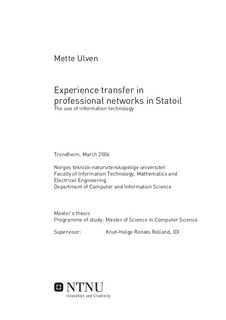Experience transfer in professional networks in Statoil - The use of information technology
Master thesis
Permanent lenke
http://hdl.handle.net/11250/2571076Utgivelsesdato
2006Metadata
Vis full innførselSamlinger
Sammendrag
With competition increasing in the market, companies are seeking new ways to sustain and enhance their effeciency and competitiveness. In this regard, companies have recently been focusing on knowledge as a competitive resource, and it has become a challenge for organisations to locate andshare their knowledge. Many different approaches to managing knowledge exist, but the two extremepoints are facial interaction and the use of information technology (IT). When people in an organisationare co-located, they can interact on a frequent basis to learn from each other. This is by \citet{REF52} referred to as Communities-of-Practice (CoP), where knowledge is shared in itsnatural context, for example through story telling. In large organisations where people are geographically spread out however, IT is considered to be helpful for connecting people and spreading knowledge.In Statoil, professional networks are established to enable experience transfer between networkmembers. Network members can both be co-located in the organisation or geographically spread out, and I have therefore looked at how experiences are transferred between network members. Special attention has been paid to the value of IT for connecting network members who are spread out geographically. Throughout this report I have argued that professional networks are similar to CoPs, and they are continuously being compared. To find information about professional networks, I conducted an empirical study where network members and leaders fromthree professional networks were interviewed.
